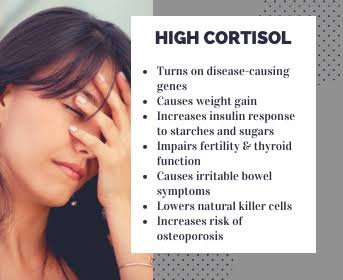Symptoms of high cortisol in women, the endocrine glands secrete hormones to control many activities in the body, including growth, metabolism, reproduction, mood and many other functions. Unbalanced hormones can cause many symptoms and diseases. Cortisol is one of the main stress hormones in the body. When cortisol production is balanced, hormone levels rise and fall naturally during the day. It is closely related to the sleep-wake cycle. Cortisol levels are usually at their lowest between midnight and 4:00. In the morning, then gradually increase until about 8 a.m., when high cortisol helps you wake up and start the day, and after 8 a.m. cortisol gradually decreases throughout the day to prepare you for sleep.
This is the circadian rhythm of cortisol levels in the body, but when you are under a state of stress or extreme stress, your body begins to respond to these stresses and strains, and your body temporarily raises cortisol and adrenaline levels to deal with stress. After these stresses are over, cortisol and adrenaline levels return to normal. But when extreme stress causes cortisol levels to rise abnormally, it creates an adrenal imbalance that often leads to a cascade of adrenal-related symptoms.
Common symptoms of high cortisol in women
Adrenal imbalance and cortisol increase in women tend to peak between the ages of 35 and 55, and are accompanied by the following symptoms:
Disruption of the daily sleep-wake cycle Tiredness and feeling tired especially in the morning Insomnia Weight gain (especially belly fat) Poor healing and cell renewal Disorders of digestion and metabolism Weak immunity Imbalances in other important hormones such as estrogen, progesterone and testosterone Weak muscles and osteoporosis Mood swings and depression Hair and skin problems Thyroid disorders.
How do you maintain the balance of cortisol level?
Women with mild to moderate adrenal gland disorder have several options that can help them feel much better and prevent symptoms from becoming severe, such as:
Achieving more stable energy levels throughout the day by eating three balanced meals and two snacks; Reducing refined carbohydrates such as sugar, flour, potatoes and white rice that cause high and low blood sugar leading to gland malfunctions Balanced use of nutritional supplements to support a healthy metabolism and hormonal balance Regulating sleep periods The body needs at least 7-8 hours of sleep every night, so make sure you fall asleep by 10:00 or 10:30 p.m. Do some relaxation and stress-relieving exercises such as yoga, tai chi, walking and other forms of moderate exercise.

